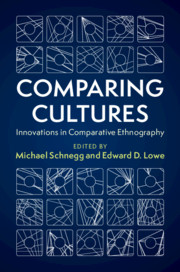Introduction
Comparative Ethnography: Its Promise, Process, and Successful Implementations
Published online by Cambridge University Press: 08 May 2020
Summary
This introductory chapter provides an overview of comparative ethnographic research in anthropology as an explicit methodological strategy and organizing framework for the different chapters of this book. The chapter opens with a discussion of the enduring promise of comparative ethnographic research as well as its main challenges given late-twentieth-century disciplinary criticisms. It then provides a summary of the process and kinds of comparative ethnographic research. We argue that ethnographic comparisons in recent decades increasingly bridge the divide between particularistic approaches and more generalizing strategies used in the past. These configurational comparisons focus on understanding and explaining the diversity of social configurations across cases and scales and interpreting their cultural and historical significance. This introduction then discusses the contributions each chapter makes to the development of this comparative paradigm by providing examples of successful comparative ethnographic research in the contemporary milieu.
Keywords
- Type
- Chapter
- Information
- Comparing CulturesInnovations in Comparative Ethnography, pp. 1 - 20Publisher: Cambridge University PressPrint publication year: 2020
References
- 1
- Cited by



